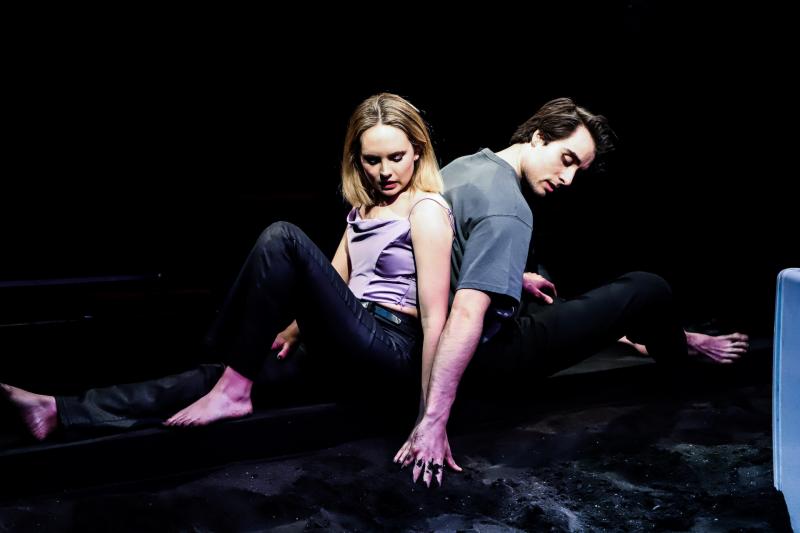Smoke, Southwark Playhouse review - dazzling Strindberg update | reviews, news & interviews
Smoke, Southwark Playhouse review - dazzling Strindberg update
Smoke, Southwark Playhouse review - dazzling Strindberg update
The perils of navigating power relations when sexual tension is all but tangible

A play’s title can be an almost arbitrary matter – there’s no streetcar but plenty of desire in that one for example – and it might have crossed Kim Davies’ mind to call her play Ms Julie, since it is a reimagining of August Strindberg’s 1888 masterpiece, Miss Julie.
Thankfully, that title was spiked and not just because it’s trite. Smoke gives us a key to unlock a complicated, clever and challenging play unafraid to treat its audience as grown-ups and all the more rewarding for that.
Sami Fendall’s set comprises a square shallow pit filled with black sand with an upturned fridge the only indication that we are in a kitchen - hardly the naturalism that its inspiration so celebrated. But we soon appreciate that not everything will be as it appears. Is the black sand volcanic, the result of a violent eruption? Is the sandpit, as it is for kids, a venue for “play”, the verb used by participants in the BDSM “scenes” underway at the party outside? Or is it a boxing ring, the square circle in which consensual pain will be inflicted and one fighter emerge triumphant?
At first, the stakes seem pretty low. John and Julie are the kind of good-looking millennials you might expect to find at any party in a big city, notwithstanding the esoteric nature of the do they’re attending. She’s flirty, not quite biting her lip and fluttering her eyelashes at him but almost, and he’s standoffish, clearly calculating the best way to present himself to make the most of a somewhat unexpected opportunity.
Then the power imbalances start to tilt this way and that. She’s a rich kid, bored and entitled, whose father owns the venue; he’s an intern, hoping to catch a break with her daddy and make it as an artist. (At that point the anchoring to Strindberg’s characters and plot became clear and I confess my mind raced forward to how the play might mine that very rich seam). She’s interested in exploring the shallower end of the BDSM pool and he’s experienced and more than happy to lead her on. Each has something the other wants, each has much to lose too, neither can entirely trust their instincts - who is the predator here, if indeed there is one at all?  The co-directors, Polina Kalinina and and Júlia Levai, are extremely adept in constructing this delicious set-up and get super performances from their leads (pictured above), who are married in real life. Meaghan Martin perfectly captures the coquettish bravado of Julie, age 20, that curdles into confusion, fear and a cruelty both inflicted and endured. Oli Higginson somehow avoids an oily creepiness in his slowish seduction of Julie, the charisma and subtlety of his performance as the older John – he's 31 – masking essentially abhorrent behaviour. I can’t have been alone in thinking him a decent bloke right up until the end of the play, but then you look back on it… And I promise you that you will look back on it.
The co-directors, Polina Kalinina and and Júlia Levai, are extremely adept in constructing this delicious set-up and get super performances from their leads (pictured above), who are married in real life. Meaghan Martin perfectly captures the coquettish bravado of Julie, age 20, that curdles into confusion, fear and a cruelty both inflicted and endured. Oli Higginson somehow avoids an oily creepiness in his slowish seduction of Julie, the charisma and subtlety of his performance as the older John – he's 31 – masking essentially abhorrent behaviour. I can’t have been alone in thinking him a decent bloke right up until the end of the play, but then you look back on it… And I promise you that you will look back on it.
Not least to reconsider the title. The ice is broken between the pair with a shared cigarette (symbolised, like much that is physically harmful, by sand allowed to slide through fingers). They also joke about the carcinogenic properties of tobacco, an early example of the risk they accept in pursuit of pleasure. Smoke also obscures the danger of fire, and the pair spend a lot of time hiding the passion each feels for the other (or, more accurately, the other as presented). Finally, and the only time we see actual smoke, it looks like a traditional post-coital cigarette but what, exactly, is Julie winding down from? As the playwright points out, the audience is the third party in this ménage-a-trois and it’s for us to work that final image out.
All sorts of issues bubble to the surface across an exhilarating 70 minutes. Where does consent start and finish in an encounter freighted with shifting power bases? How can the roles of subs and doms be navigated in a sex-positive environment in which fantasies are embraced and (wouldn’t you know it) Het-Doms have the er… whip hand? And where does #MeToo (which has come to play a huge role in such conversations since the play was first staged in 2014) fit into the conversation? And that’s without bringing the lens of fourth-wave feminism to the analysis.
So we’re left to make up our own minds, the production admirably denying us the comfort of easy answers in a culture that maintains an insatiable appetite for transgression and its subsequent condemnation. I am sure of one thing though – I’m glad I was 20 in 1983 and not in 2023.
rating
Explore topics
Share this article
The future of Arts Journalism
You can stop theartsdesk.com closing!
We urgently need financing to survive. Our fundraising drive has thus far raised £49,000 but we need to reach £100,000 or we will be forced to close. Please contribute here: https://gofund.me/c3f6033d
And if you can forward this information to anyone who might assist, we’d be grateful.

Subscribe to theartsdesk.com
Thank you for continuing to read our work on theartsdesk.com. For unlimited access to every article in its entirety, including our archive of more than 15,000 pieces, we're asking for £5 per month or £40 per year. We feel it's a very good deal, and hope you do too.
To take a subscription now simply click here.
And if you're looking for that extra gift for a friend or family member, why not treat them to a theartsdesk.com gift subscription?
more Theatre
 Ragdoll, Jermyn Street Theatre review - compelling and emotionally truthful
Katherine Moar returns with a Patty Hearst-inspired follow up to her debut hit 'Farm Hall'
Ragdoll, Jermyn Street Theatre review - compelling and emotionally truthful
Katherine Moar returns with a Patty Hearst-inspired follow up to her debut hit 'Farm Hall'
 Troilus and Cressida, Globe Theatre review - a 'problem play' with added problems
Raucous and carnivalesque, but also ugly and incomprehensible
Troilus and Cressida, Globe Theatre review - a 'problem play' with added problems
Raucous and carnivalesque, but also ugly and incomprehensible
 Clarkston, Trafalgar Theatre review - two lads on a road to nowhere
Netflix star, Joe Locke, is the selling point of a production that needs one
Clarkston, Trafalgar Theatre review - two lads on a road to nowhere
Netflix star, Joe Locke, is the selling point of a production that needs one
 Ghost Stories, Peacock Theatre review - spirited staging but short on scares
Impressive spectacle saves an ageing show in an unsuitable venue
Ghost Stories, Peacock Theatre review - spirited staging but short on scares
Impressive spectacle saves an ageing show in an unsuitable venue
 Hamlet, National Theatre review - turning tragedy to comedy is no joke
Hiran Abeyeskera’s childlike prince falls flat in a mixed production
Hamlet, National Theatre review - turning tragedy to comedy is no joke
Hiran Abeyeskera’s childlike prince falls flat in a mixed production
 Rohtko, Barbican review - postmodern meditation on fake and authentic art is less than the sum of its parts
Łukasz Twarkowski's production dazzles without illuminating
Rohtko, Barbican review - postmodern meditation on fake and authentic art is less than the sum of its parts
Łukasz Twarkowski's production dazzles without illuminating
 Lee, Park Theatre review - Lee Krasner looks back on her life as an artist
Informative and interesting, the play's format limits its potential
Lee, Park Theatre review - Lee Krasner looks back on her life as an artist
Informative and interesting, the play's format limits its potential
 Measure for Measure, RSC, Stratford review - 'problem play' has no problem with relevance
Shakespeare, in this adaptation, is at his most perceptive
Measure for Measure, RSC, Stratford review - 'problem play' has no problem with relevance
Shakespeare, in this adaptation, is at his most perceptive
 The Importance of Being Earnest, Noël Coward Theatre review - dazzling and delightful queer fest
West End transfer of National Theatre hit stars Stephen Fry and Olly Alexander
The Importance of Being Earnest, Noël Coward Theatre review - dazzling and delightful queer fest
West End transfer of National Theatre hit stars Stephen Fry and Olly Alexander
 Get Down Tonight, Charing Cross Theatre review - glitz and hits from the 70s
If you love the songs of KC and the Sunshine Band, Please Do Go!
Get Down Tonight, Charing Cross Theatre review - glitz and hits from the 70s
If you love the songs of KC and the Sunshine Band, Please Do Go!
 Punch, Apollo Theatre review - powerful play about the strength of redemption
James Graham's play transfixes the audience at every stage
Punch, Apollo Theatre review - powerful play about the strength of redemption
James Graham's play transfixes the audience at every stage
 The Billionaire Inside Your Head, Hampstead Theatre review - a map of a man with OCD
Will Lord's promising debut burdens a fine cast with too much dialogue
The Billionaire Inside Your Head, Hampstead Theatre review - a map of a man with OCD
Will Lord's promising debut burdens a fine cast with too much dialogue

Add comment